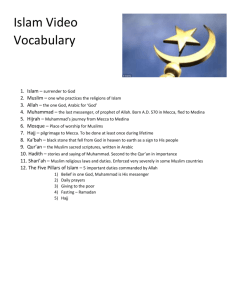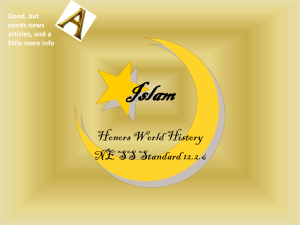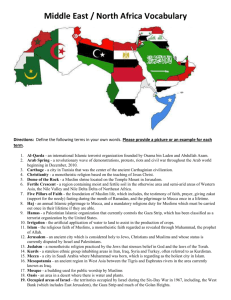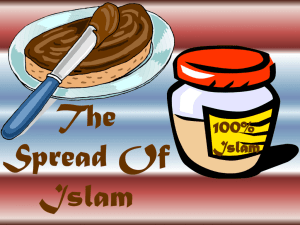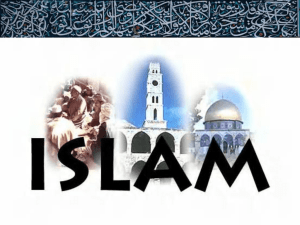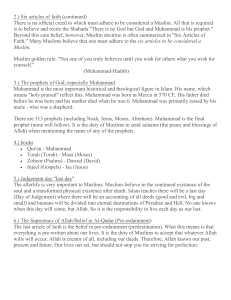The Rise of Islam (Chapter 10)
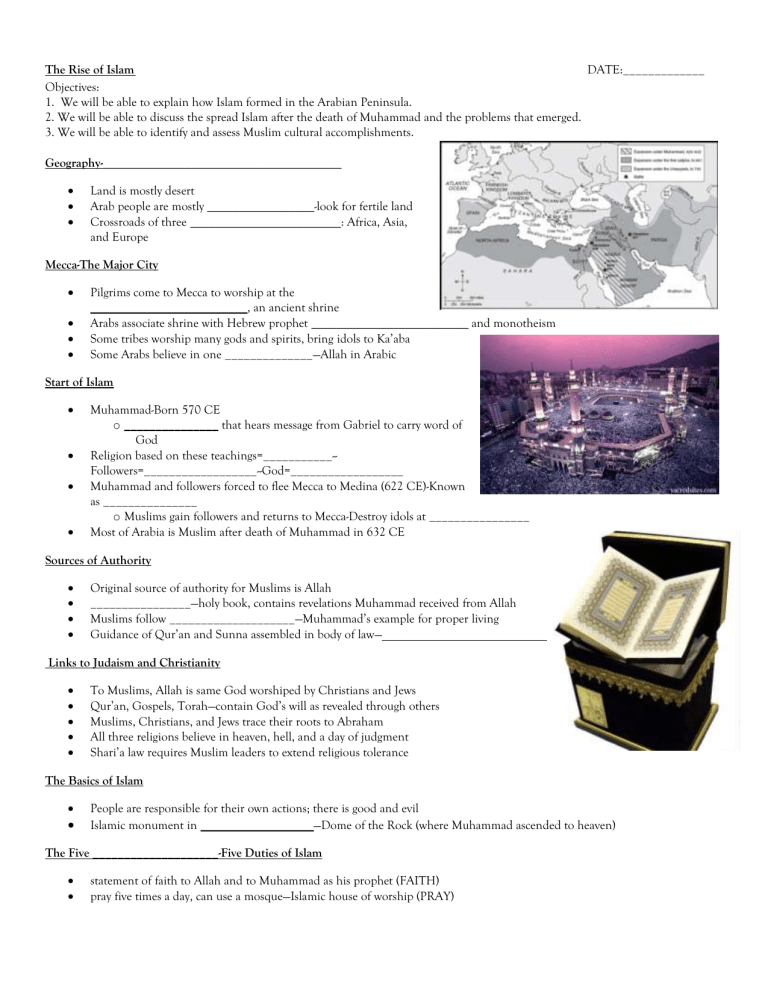
The Rise of Islam
Objectives:
1. We will be able to explain how Islam formed in the Arabian Peninsula.
2. We will be able to discuss the spread Islam after the death of Muhammad and the problems that emerged.
3. We will be able to identify and assess Muslim cultural accomplishments.
Geography-______________________________________
DATE:_____________
Land is mostly desert
Arab people are mostly _________________-look for fertile land
Crossroads of three ________________________: Africa, Asia, and Europe
Mecca-The Major City
Pilgrims come to Mecca to worship at the
_________________________, an ancient shrine
Arabs associate shrine with Hebrew prophet _________________________ and monotheism
Some tribes worship many gods and spirits, bring idols to Ka’aba
Some Arabs believe in one ______________—Allah in Arabic
Start of Islam
Muhammad-Born 570 CE o _______________ that hears message from Gabriel to carry word of
God
Religion based on these teachings=___________--
Followers=__________________--God=__________________
Muhammad and followers forced to flee Mecca to Medina (622 CE)-Known as _______________ o Muslims gain followers and returns to Mecca-Destroy idols at ________________
Most of Arabia is Muslim after death of Muhammad in 632 CE
Sources of Authority
Original source of authority for Muslims is Allah
________________—holy book, contains revelations Muhammad received from Allah
Muslims follow ____________________—Muhammad’s example for proper living
Guidance of Qur’an and Sunna assembled in body of law—
Links to Judaism and Christianity
To Muslims, Allah is same God worshiped by Christians and Jews
Qur’an, Gospels, Torah—contain God’s will as revealed through others
Muslims, Christians, and Jews trace their roots to Abraham
All three religions believe in heaven, hell, and a day of judgment
Shari’a law requires Muslim leaders to extend religious tolerance
The Basics of Islam
People are responsible for their own actions; there is good and evil
Islamic monument in __________________—Dome of the Rock (where Muhammad ascended to heaven)
The Five ____________________-Five Duties of Islam
statement of faith to Allah and to Muhammad as his prophet (FAITH)
pray five times a day, can use a mosque—Islamic house of worship (PRAY)
give alms, or money for the poor (CHARITY)
fast between dawn and sunset during holy month of Ramadan (FASTING)
perform the hajj—pilgrimage to Mecca—at least once (PILGRIMAGE)
A Way of Life
Scholar class, ullama, and teachers apply religion to life; no priests
____________________, means struggle to become better Muslim
Successors of Muhammad Spread Islam
Caliphs (Successors) Guide
_________________ spreads by conquering lands-Caliphs tie together religion and rule o By ________________-spreads from Indus River to Atlantic Ocean
Why Conquered Accepted Rule o Appealing message-Quran too o Avoid paying non-Muslim Tax o People of the book aka Christians and Jews accepted--could still prosper but not spread religion
Expansive Control
_________________ (750-1258) o Empire capital-Baghdad o Controlled: Iran, Iraq, C. Asia o Strong bureaucracy to rule over empire-Growth in Learning, Arts
Controls trade-Europe to Asia
Other Muslim _________________ (State that tied politics and Religion) o ________________ (661-750)
First great Caliphate-Extends territory and strengthens central government o _________________ (909-1171)
Controls North Africa, W. Arabia and Syria
Islamic Life
City Life o Grand Cities with elaborate buildings o Baghdad approached 1 million in _____________
Social Classes o 1. Upper Class-Muslim ______________ o 2. Second Class-Converts o 3. Third class-Protected people-Christ., Jews, and Zoroastrians o 4. _____________-Worked for freedom
Women o Had more rights because of _____________ teaching-even education o Fades over time
Islamic Cultural Accomplishments
Scholarship o __________________________________ (Baghdad)
800s-Preserves and expands classical texts of Greece, India, and Persia
Arts and Science o _________________-Art of beautiful handwriting used to glorify Allah o __________________________________________________________-Collection of fairy tales, parables and legends
Math and Science o Math sets foundation for _________________ o Science see major advancements regarding _________________

